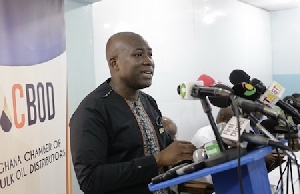The Chief Executive Officer of the Chamber for Bulk Oil Distribution Companies (BDC) Senyo Horsi has warned government to end alleged unfair pricing war its engaged in with some BDC’s and Oil Marketing Companies (OMC’s) in the country.
According to Senyo Horsi government is alleged to be engaged in subsiding its companies to stay prices sometimes when prices of petroleum products goes up in the country.
Mr. Horsi told the thebftonline.com that government which is controlling some 30 percent of the market has through Ghana Oil Company Limited (GOIL) and Bulk Oil Storage and Transportation Company Limited (BOST) stayed prices at the pump which leads to forcing other OMC’s and BDC’s also staying prices.
This practice according to him leads to losses to the private operators and those that still increase their price are affected by losing some consumers who have become sophisticated and always look at for OMC’s that have lower prices to buy fuel from.
“I think the market will have to be a level playing field for all of us, government has a lot of the time I think cushioned its companies like BOST and GOIL with subsides which has resulted to GOIL in particular not increasing their prices at the pump when petroleum prices have gone up on the market.”
“This is the price war we talk about which is unfair and forces other OMC’s and BDC’s who don’t receive such subsides to also drop their prices which affects them. I thought subsides have been scrapped,” he stated.
The thebftonline.com can firm that, at the last pricing window and others when petroleum prices have gone up in the country GOIL has stayed its prices at the pump and have engaged in huge publicity drive in the media to entice new consumers to buy fuel from them. Though some multinational OMC’s like Engen and Shell had their prices increased, GOIL stayed its price 3 cedis 63 pesewas when prices went up some three weeks ago.
In view of this the thebftonline.com checks shows that GOIL has not been this time around reviewed their prices down wards especially on petrol when petroleum prices were reduced over the weekend.
Cause of change in price
In Ghana, one of the pivotal factors that determines a change in the prices of petroleum products are depreciation of the cedi, huge taxes and high inflation rate.
It is also important to note that current oil price fluctuations in Ghana are largely due to poor performance of the local currency on forex market.
When oil prices are increased, it triggers upward adjustments of all items in the market. It affects transport fares, prices of basic commodities and cost of production. Despite this, the introduction of subsidies by succeeding governments always lead to under recoveries due to their inability to honor their part of the subsidy bargain.
NPA on concealing subsides
In 2013, the National Petroleum Authority, NPA said fuel subsidy should be scrapped because of its impact on the economy, and in so doing this burden be passed unto the consumer.
NPA argued that the subsidy on fuel is costing Ghana some 2.4 billion cedis ($1.3 billion) and it is expected to rise 140 percent, hence its position to advise the government of Ghana to remove the subsidy and pass it unto the consumers.
At the time an IMF 2009 Country report had suggested that, the rising oil import contributed to the widening of the external current account deficit from 9.9 percent of GDP in 2006 to 19.3 percent of GDP in 2008.
Business News of Saturday, 26 November 2016
Source: B&FT
Gov’t must end unhealthy competition – BDC’s
Business
















